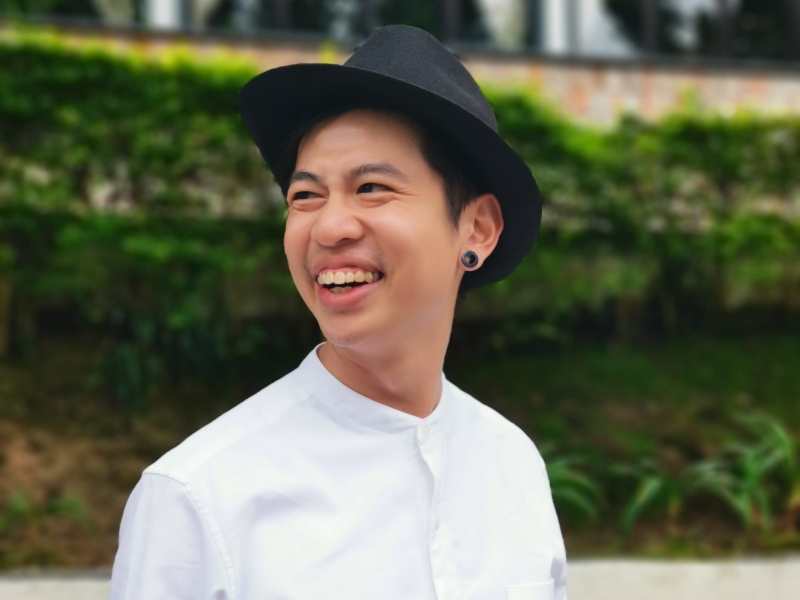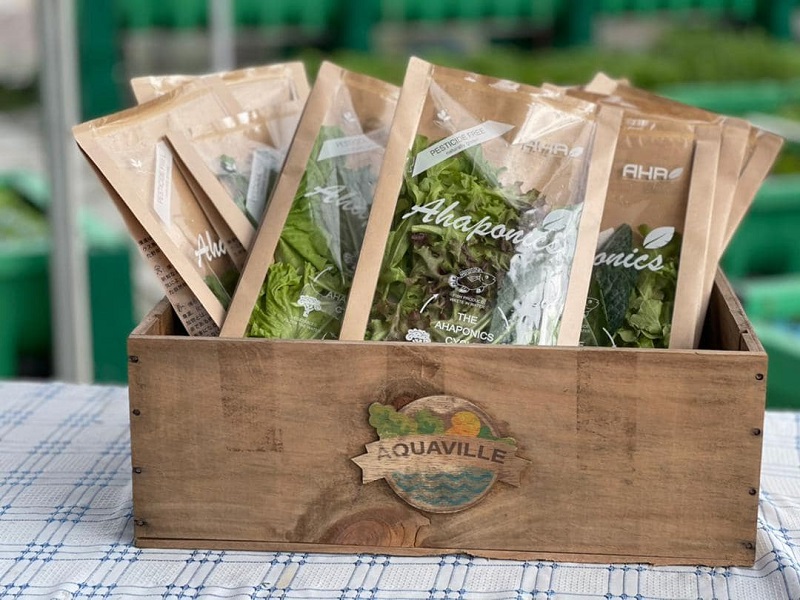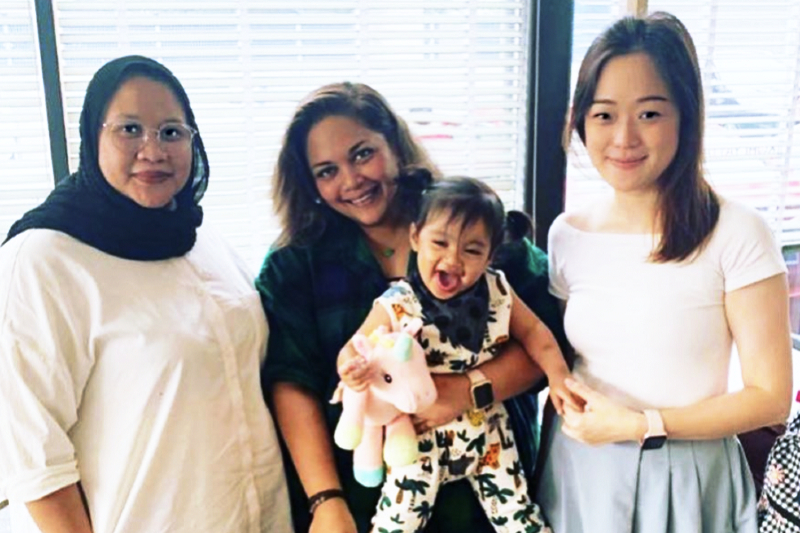
Members behind The Angel Project bring different talents and experiences to the initiative, says Chua (centre) (Photo: The Angel Project)
Leonard Chua’s own experience of hard times enables him to empathise with those in the same boat. He does not stop there. Remembering how relatives pooled their limited resources to help his family pull through, he now wants to extend a hand to those fighting to keep afloat in the pandemic.
Early last month, Chua gathered some friends to start The Angel Project, which connects those seeking aid with those who wish to adopt or sponsor families. As the conduit, they connect both parties and customise needs and contributions, so things can move fast.
“I tell rich friends that we are looking more for individual contributions than corporate sponsors. Speed is more important than marketing and we want to keep it simple, nothing fancy,” he says.
His family lost their business during the 1987 and 1997 financial crises. “Growing up with an older brother, not having enough was a daily conversation at home. I am thankful my aunts, who earned only enough for themselves, pooled their money to help us,” says the 35-year-old psychology graduate.
leo_chua.jpg

The Angel Project’s volunteers bring different skills to the table. Chua, head of digital at his workplace, sets the pace and expectations as project lead. He brought in the first batches of families who needed help and the bulk of initial funding by sponsors. A social influencer helps to raise awareness of the initiative while members from advertising agencies chart strategy.
Stay-at-home mothers who used to run businesses help with back-end operations, keeping track of funds coming in and channelling them to B40 (bottom 40% income group) families who have lost their household income and have children aged 20 and below. Issues on planning and managing operations are handled by someone who works in sales while a volunteer who is a compliance analyst makes sure every transaction is recorded and the receipts are in order and available for whoever wishes to check.
Unlike professionals, many of whom can bounce back when things pick up, B40 families have limited education or knowledge, no network and are unlikely to get back on their feet quickly, says Chua, explaining why the project focuses on this group. Instead of the usual practice of handing over food supplies, the team links applicants to those willing to adopt them for three to six months.
Generous souls have asked if they can still reach out after that time frame. “Of course. We are just doing the ‘matchmaking’. At the end of the day, it’s up to them and the families,” he says.
Chua is surprised that many of those who seek aid do not require food. Instead, they need money — which can make some sceptical. “People say they don’t believe in giving money. Honestly, having gone through what I did, sometimes we do need a bit of money to make things happen. That’s why we undertake to bank in money from donors for the families, in small amounts.”
It heartens Chua that people who like to help will always find ways to do so. And the unwilling ones will ask a lot of questions to justify their inaction. “Anyone can be an angel. It is inspiring to see the people who have come forward,” he says.
A twenty-something guy who runs a household appliance shop chose to support a family living in Kampung Baru, Kuala Lumpur, for six months. Non-governmental organisations (NGOs) had given them dry goods, the family say, but they needed someone to fix a water pipe in their home. For years, they had been getting water from a neighbour’s tap and paying an estimated sum for it. With their own supply and meter, they could pay for what they use.
aquaville.jpg

In another case, a widow had taken on 24-hour shifts in a nursing home, which paid freelance nurses RM10 to RM12 hourly, to feed her three children. “We have started sending her organic vegetables weekly and fresh fish every alternate week, besides settling her rent for three months so she can spend more time with the kids,” says Chua.
Another family of 10 has enough food but the daughter is sitting for her SPM this year and there is no internet at home. A sponsor has agreed to get them a laptop and install internet service.
“Things like this can really change people’s lives. We’re doing something to help people get by. At the same time, we want to make a difference,” notes Chua.
Covid-19 prevents the team from meeting physically, but that has not stopped them from helping without being physically present. The Angel Project works with partners where necessary. For example, Studio20 helped it develop a website where people can fill up a simple form to apply for help, while aquaponic farm Aquaville sends fresh greens directly to various families.
Chua is confident that people want to give; it is just a matter of connecting the needs with the funds. “I’m very happy doing this because I’ve met really amazing people. Where we cannot help, we channel the cases to other groups doing the same thing. It’s like, let’s do it together.”
Connecting white flaggers with willing hands
As Covid-19 infections went up and in tandem with that, white flags and suicide cases, Tiffany Chew took a drive around her neighbourhood in Bukit Jalil, Kuala Lumpur. Friends living elsewhere had spotted white flags, but she could not see any. It made her even more concerned: What if there are flaggers who cannot get help because they are stuck on the higher floors of their apartments?
The product designer then consulted two friends and they came up with Save the White Flag, a website that connects flaggers with donors or acts on behalf of those willing to render aid but cannot or do not wish to be in direct contact with recipients. Matching is done on a case-by-case basis, following STWF’s core values: survivability, sustainability and sanity.
The aim is to use the platform to connect people in urgent need with those living nearby and or encourage netizens to raise the alert for flaggers.
Chew and two of three other core nembers are mothers holding full-time jobs. She is a senior manager at Plus Xnergy while Nadira Bashir, her classmate in Malaysia, then New Zealand, where they studied computer graphics and design, is a lecturer at Xiamen University Malaysia. Diana Arifin, their senior in NZ, runs a family business. Nur Munira, Nadira’s sister and STWF’s case director, brings her experience at Manipal International University to bear by telling them about management standard operating procedures and regulations.
save_the_white_flag.jpg

“She reminds us that this is an emergency relief fund, so we cannot keep the money for too long — it needs to be distributed fast,” says Nadira, the content director for STWF. Their initial reluctance to handle monetary donations quickly gave way to necessity, adds Chew, who is mindful about the money entrusted to them by many who have no time to arrange groceries or other things, and makes sure all transactions are transparent and legitimate.
Donors can make a one-off contribution in cash or kind or commit to supporting flaggers for 3 to 12 months, as sustainability is key. They can choose to deal directly with flaggers or have the group, which has 10 volunteers on board, be the middle person.
The sanity aspect is crucial too; STWF is recruiting counsellors for those in need of mental support and hopes to gather the resources to help them. With families of their own, the team is concerned about flaggers with young children or elderly dependents and the effects of loss of income on vulnerable groups.
Matching donors with flaggers is not a simple matter of connecting both sides. And every case has its story, as Chew learnt after contacting a landlord to whom a flagger owed two months’ rent.
“I assumed the landlord would be okay [financially] but found out she had just delivered a premature baby and her husband had no income. She only had a motorbike and would use Grab to take the baby for check-ups.
“It was stressful negotiating with her, but we didn’t want to be unfair to one party. We managed to quickly send over the rent, and that helped both sides. That made our work really worth it.”
STWF will continue to reach out to flaggers, depending on how the Covid situation goes. But the team, which draws comfort from knowing they play a part in helping struggling Malaysians and others, hopes the pandemic will not drag on.
Keeping the site up beyond six months will not augur well for the country, they say. The hope is to turn the platform into something else and offer other services eventually. “We have people who are willing to become tuition teachers. We’ll see how things evolve,” says Chew.
This article first appeared on Aug 2, 2021 in The Edge Malaysia.


